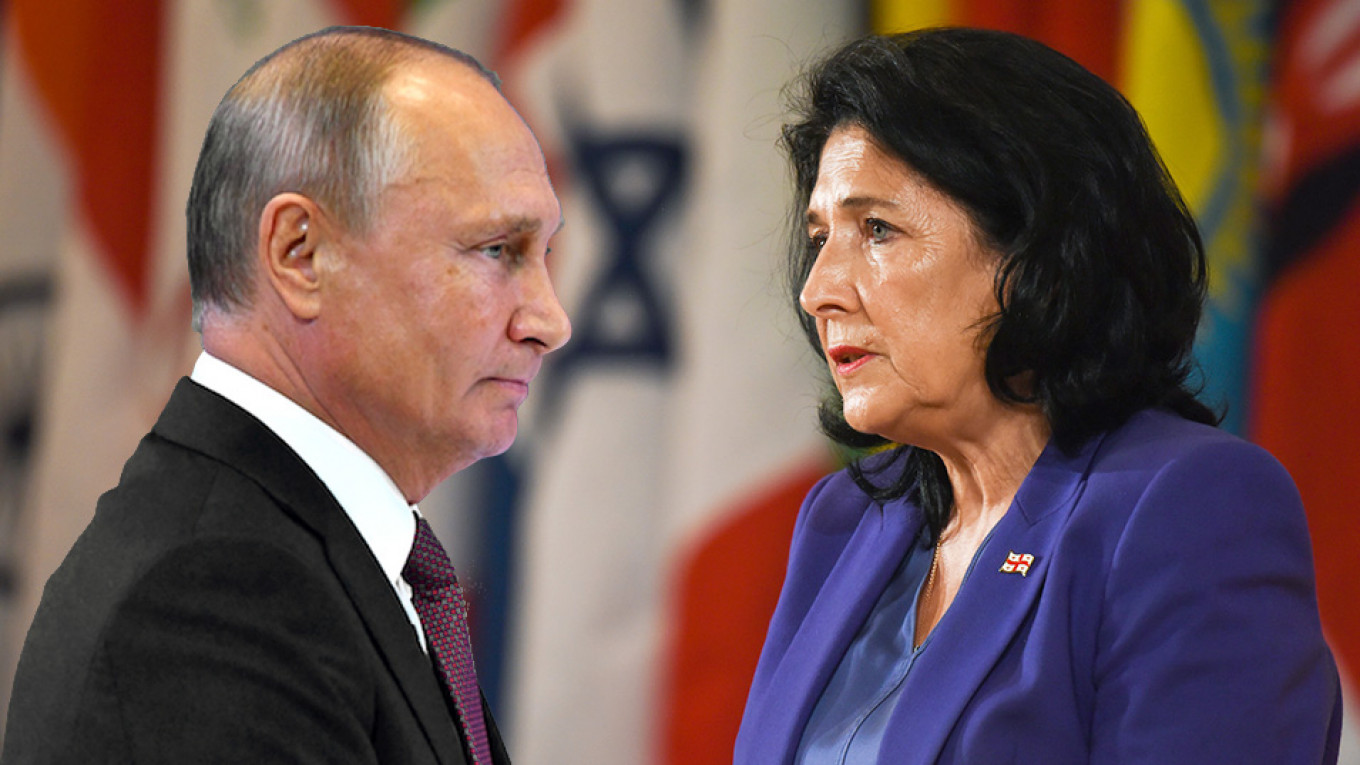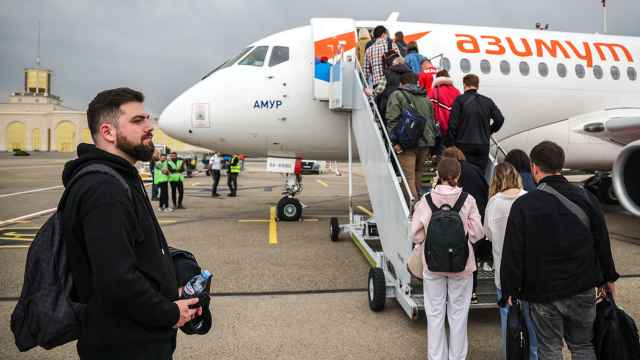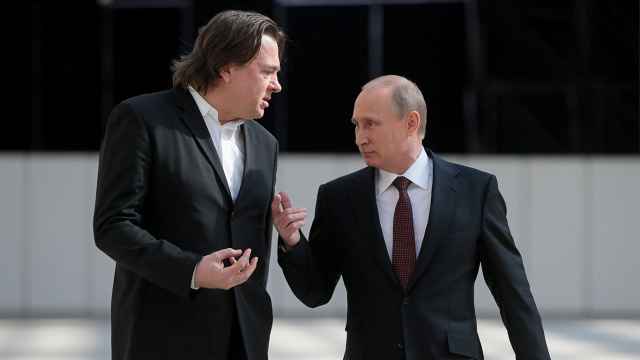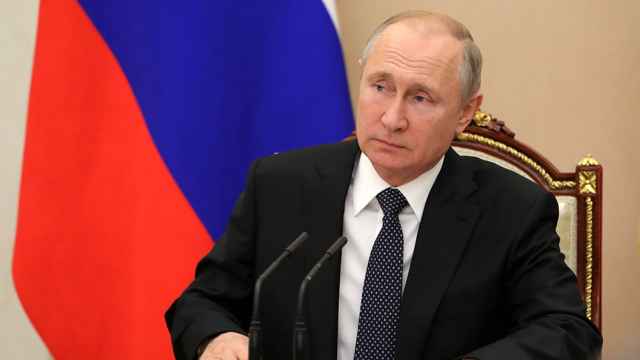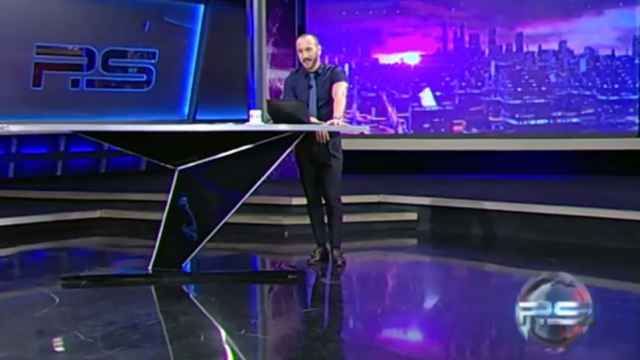The stage was prepared last week for Russian President Vladimir Putin to hammer tiny Georgia with new economic sanctions after parliament called on him to punish anti-Kremlin protests. Instead, Putin refused “because I respect the Georgians.”
The uncharacteristic reaction left some wondering if the Kremlin is beginning to rethink its traditionally tough approach to neighboring states by turning to soft-power tools. Putin recently also joined with the European Union to endorse a coalition government in Moldova led by pro-Westerners, and has at least considered the return of captured sailors to Ukraine.
It’s about time for a change, according to Georgia’s President Salome Zourabichvili. A policy of war, territorial occupation and punitive sanctions is “only confirming Georgia in its Western course,” said Zourabichvili, a former French diplomat of Georgian heritage, interviewed during a conference on Georgia’s European path in the Black Sea resort of Batumi.
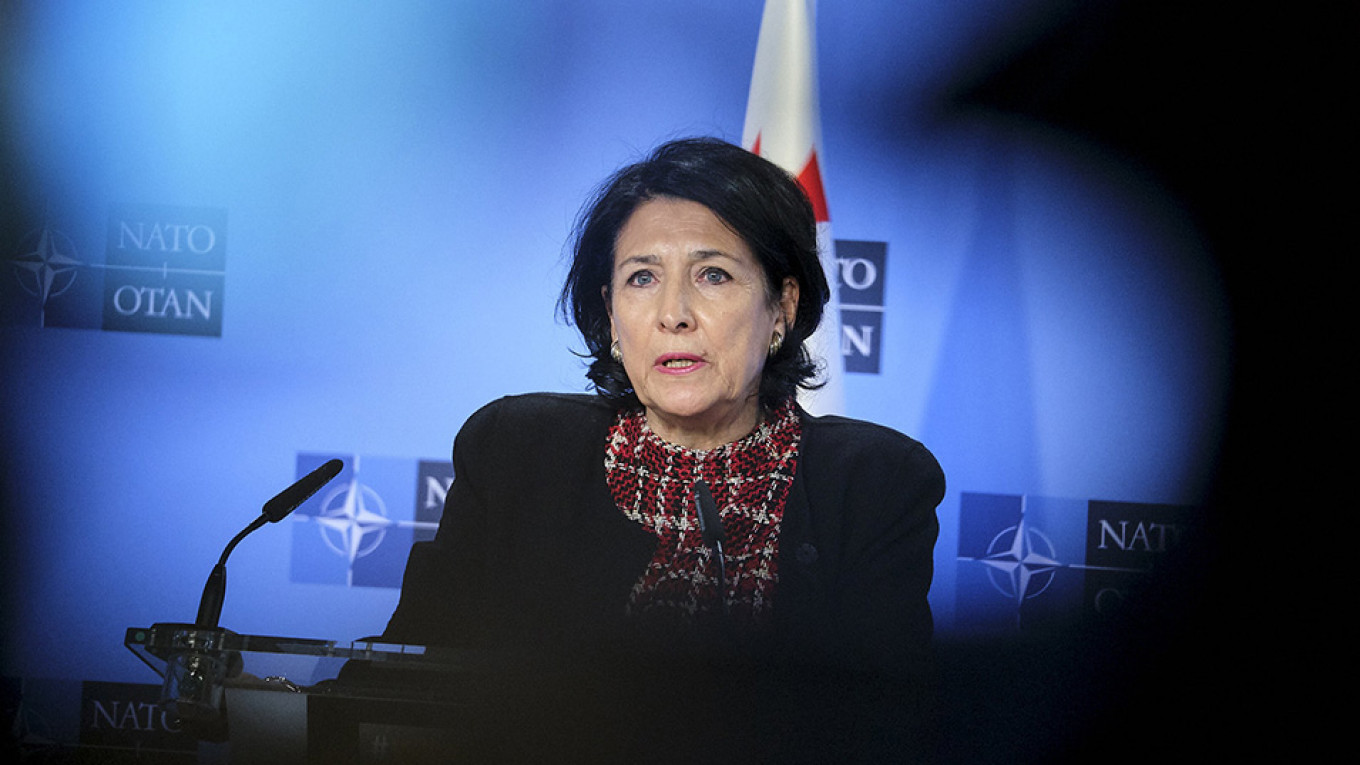
Russia has been in conflict with former Soviet satellites for years as Georgia, Ukraine and Moldova seek greater integration with the EU and hope for membership. Georgia and Ukraine are also eager to join the North Atlantic Treaty Organization (NATO), infuriating the Kremlin, which routinely accuses the West of undermining Russia’s security by encroaching on its backyard. Yet relentless Russian economic and military pressure has only made these countries more determined to escape Moscow’s orbit and fueled the hostility that the Kremlin has sought to combat.
Still, the violent protests that erupted last month at the sight of a Russian legislator in the speaker’s chair at a meeting in Georgia’s parliament shocked the governments in Moscow and Tbilisi alike. Each accused their common bete noire – former Georgian President Mikheil Saakashvili – of staging them, but the reality was more disturbing.
Entrenched feeling
The large youth-led protest at the start was spontaneous, even if political parties later sought to capitalize on it, said Zourabichvili. It was a “manifestation of the very strongly, deeply entrenched feeling of the Georgian population that is not accepting the status quo.”
That refers to the situation since a 2008 war between Russia and Georgia, which left Russian troops in control of two separatist Georgian territories – South Ossetia and Abkhazia. “It’s not true you can forget about these things,” said Zourabichvili, “because they don’t forget you.”
Shota Dighmelashvili, a 33-year-old journalist, was among the protest leaders. He voted against Saakashvili in the 2012 parliamentary elections that saw his party ousted from power and told the former Georgian leader – now living in Ukraine – to mind his own business when he commented on the protests.
Even so, Dighmelashvili worries the current government, run from behind the scenes by billionaire businessman Bidzina Ivanishvili, has allowed momentum toward Europe to flag as it has sought to ease tensions with Russia.
“We don’t want to gravitate toward Russia,” said Dighmelashvili. “Sadly, everyone but the government sees this.“
Starting in 2013, soon after Ivanishvili’s party came to power, Russia in stages lifted embargoes on Georgian wine, mineral water and agricultural products. Those moves, plus an influx of Russian tourists – 1.4 million last year – have begun to make the country more economically dependent on Moscow again.
Trading with the enemy
On Wednesday, Ivanishvili said anyone asking to shut down Georgia’s access to Russian markets were “fools” and “enemies of our country.” It wasn’t clear who had made such a demand.
A ban on direct flights to Georgia that Putin imposed in response to the protests remains in force, penalizing the Caucasus nation’s tourist industry. Russia has often resorted to sanctions against its neighbors when political tensions spiked. It applied military force after Ukraine’s pro-Kremlin president was ousted in the 2014 revolution, annexing Crimea and stoking a separatist conflict in the country’s east that has killed 13,000 people.
Russia’s policy toward the three states hasn’t “exactly worked, not yet” and change may be under way, said Vladimir Frolov, a former Russian diplomat and now Moscow-based foreign policy analyst.
Hard-soft
The policy’s objective was to have NATO cancel its pledge, made at a 2008 summit, that Georgia and Ukraine will one day become members, said Frolov. Russia also wants both countries to join the Moscow-led Eurasian Union, instead of the EU.
“So from hard-hard power they are switching to hard-soft power,” said Frolov, adding that Putin is in no hurry. “We need formal abrogation of NATO membership as a goal for Georgia and some form of affiliation with Moscow as a price for restoring some sovereignty.”
It may be too late for that. After the 2008 war, Moscow recognized the independence of Abkhazia and South Ossetia, and the latter in particular is now de facto Russian territory. It wouldn’t be easy to undo those changes and it’s unlikely any Georgian leader could accept the demands and survive in power.
The challenge in Ukraine is at least as great. Volodomyr Zelenskiy, Ukraine’s new president spoke to Putin for the first time on July 11, asking for revived peace talks and the release of 24 sailors seized in November, as their small naval vessels tried to pass into the Sea of Azov, a shared water near Crimea. On Wednesday, a Moscow court prolonged the sailors’ detention.
The threat from Russia has driven Georgia, and to a lesser extent Ukraine, to do better in meeting EU standards in areas such as democracy and business environment than many countries in the Western Balkans, according to a study last year by the Center for European Policy Studies, a Brussels-based think tank.
EU aspirations
That is true despite the fact that Balkan nations from Albania to Serbia have been told they can join the EU, whereas Georgia and Ukraine — pointedly — have not. In what may be a direct consequence of the protests, Zourabichvili announced on July 11 that Georgia will start meeting the EU’s onerous accession requirements anyway.
“Putin has lost both of them,” Michael Emerson, the report’s co-author, said of Georgia and Ukraine. “Russia has become the enemy, which is something that was not inevitable and will be very difficult to reverse.”
Even in Belarus, traditionally Moscow’s closest ally, escalating economic pressure has failed so far to persuade President Alexander Lukashenko to accept greater integration with Russia, as a prelude to a possible merger that could allow Putin to sidestep term limits and rule as head of a united state. Lukashenko has responded by hedging toward the EU and China.
Georgia’s economic horizons have also expanded. The current government has continued polices aimed at making Georgia attractive to foreign investors (it now ranks sixth in the World Bank’s Ease of Doing Business index, above the U.S. and the U.K.), and also has a free trade agreement with China, as well as with the EU.
Georgia can trade with China, the EU, other ex-Soviet countries, the Gulf states, Turkey and Iran — a market of 2.3 billion people, says Mikheil Chkuaseli, chief executive of Gurieli, a Georgian tea producer. “Why do we keep looking at the 140 million in Russia?”
Russia still has significant resources of language, economy and people-to-people goodwill to draw upon, if it chooses to switch to soft power in dealing with Georgia, according to Zourabichvili.
“It just doesn’t know how to exploit that,” she said. “It’s probably a legacy of empires.”
A Message from The Moscow Times:
Dear readers,
We are facing unprecedented challenges. Russia's Prosecutor General's Office has designated The Moscow Times as an "undesirable" organization, criminalizing our work and putting our staff at risk of prosecution. This follows our earlier unjust labeling as a "foreign agent."
These actions are direct attempts to silence independent journalism in Russia. The authorities claim our work "discredits the decisions of the Russian leadership." We see things differently: we strive to provide accurate, unbiased reporting on Russia.
We, the journalists of The Moscow Times, refuse to be silenced. But to continue our work, we need your help.
Your support, no matter how small, makes a world of difference. If you can, please support us monthly starting from just $2. It's quick to set up, and every contribution makes a significant impact.
By supporting The Moscow Times, you're defending open, independent journalism in the face of repression. Thank you for standing with us.
Remind me later.


